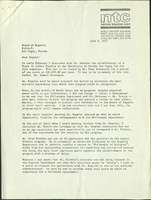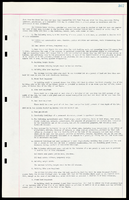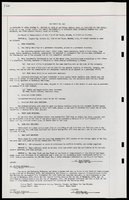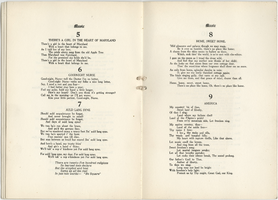Search the Special Collections and Archives Portal
Search Results
Angela Castro oral history interview
Identifier
Abstract
Oral history interview with Angela Castro conducted by Stefani Evans, Cecilia Winchell, Kristel Peralta, Vanessa Concepcion, and Ayrton Yamaguchi on November 05, 2020 for the Reflections: The Las Vegas Asian American and Pacific Islander Oral History Project. Castro begins the interview by talking about her early life, childhood, what Guam was like, and the history of her parents and grandparents. She describes the difference in public and private education in Guam and compares it to the United States. She explains the reason why she moved to Las Vegas, Nevada in 1998 and attended the University of Nevada, Las Vegas for public relations. Castro then talks about the differences between older and newer generations, the political atmosphere in Guam, and the differences between the United States and Guam in politics. She also talks about the discrimination she has experienced throughout her life and diversity in the workplace. Lastly, she describes her culture and traditions during holidays, the struggles with an absence of culture within her family, and her personal religious beliefs.
Archival Collection

Transcript of interview with Rabbi Mendy Harlig by Barbara Tabach, October 18, 2017
Date
Archival Collection
Description
Known throughout the Las Vegas community as Rabbi Mendy, Mendy Harlig is a leader of the Chabad in Las Vegas, which was introduced to the valley in 1990 by his brother Rabbi Shea Harlig. Since his youth spent growing up in the Crown Heights section of Brooklyn, where he was surrounded by Hasidic Jews, Rabbi Mendy seemed destined to become a Chabad rabbi. During the early 1990s he often visited Las Vegas and assisted his brother at the Chabad of Southern Nevada. Then in 1997 he met and married Chaya Harlig and the couple permanently relocated to the valley to be the spiritual leaders of the Chabad of Green Valley. As their family grew, so did their importance to the Chabad movement in Las Vegas. During this interview, Rabbi Mendy touches upon the nature of Chabad teachings and observance in the so-called “Sin City” persona of Las Vegas. He also shares about his participation in the Las Vegas Metro Chaplaincy program. He particularly reflective of his active role immediately after of the horror of the October 1 mass casualty at the Route 91 country music festival and his perspectives afterwards.
Text
Lee, Rozita Villanueva, 1934-
Born in 1934 in Lahaina, Maui, Hawai'i as the seventh of seven daughters of a sugar plantation crew boss, Rozita Villanueva Lee recalls a privileged life, because when her father became a boss, the family got electricity, a telephone, indoor plumbing, and fluorescent lighting in their house. The camps were organized by nationality: the Filipino workers and their families lived in one camp, and the Japanese, Chinese, Portuguese, and "haole" workers and their families each lived in their own.
Person

Transcript of interview with Roger Bryan by Paul Murphy, February 27, 1979
Date
Archival Collection
Description
Text
Roger Bryan oral history interview
Identifier
Abstract
Oral history interview with Roger Bryan conducted by Paul Murphy on February 27, 1979 for the Ralph Roske Oral History Project on Early Las Vegas. Bryan, who was the principal of Harvey Dondero Elementary School at the time of the interview, mainly discusses his background in education and his experiences teaching at various schools around Southern Nevada. Bryan mentions several of the cities he lived in prior to coming to Las Vegas, Nevada as well as the various parts of town he lived in after arriving. He also talks specifically about the schools he attended in Las Vegas, superintendents in charge of the district, his decisions while on the school board, the extent of vandalism in schools, and how the school district has changed over the years. Bryan finalizes the interview with a discussion of the most influential teachers he had when he was a student.
Archival Collection

Mara Braun interview, September 9, 2019: transcript
Date
Archival Collection
Description
Interviewed by Barbara Tabach. Mara Braun, a native of Puerto Rico, has lived in Las Vegas since 1975. She is the owner/operator of a successful event and catering business. Mara married Abe Braun and raised their children in both Latinx and Jewish traditions.
Text

Correspondence from and to Lloyd Katz regarding establishment of a Chair in Judaic Studies at UNLV, 1973
Date
Archival Collection
Description
Lloyd Katz's letter to the Board of Regents requests information about the appropriate department in which to establish a Chair of Judaic Studies.
Text



